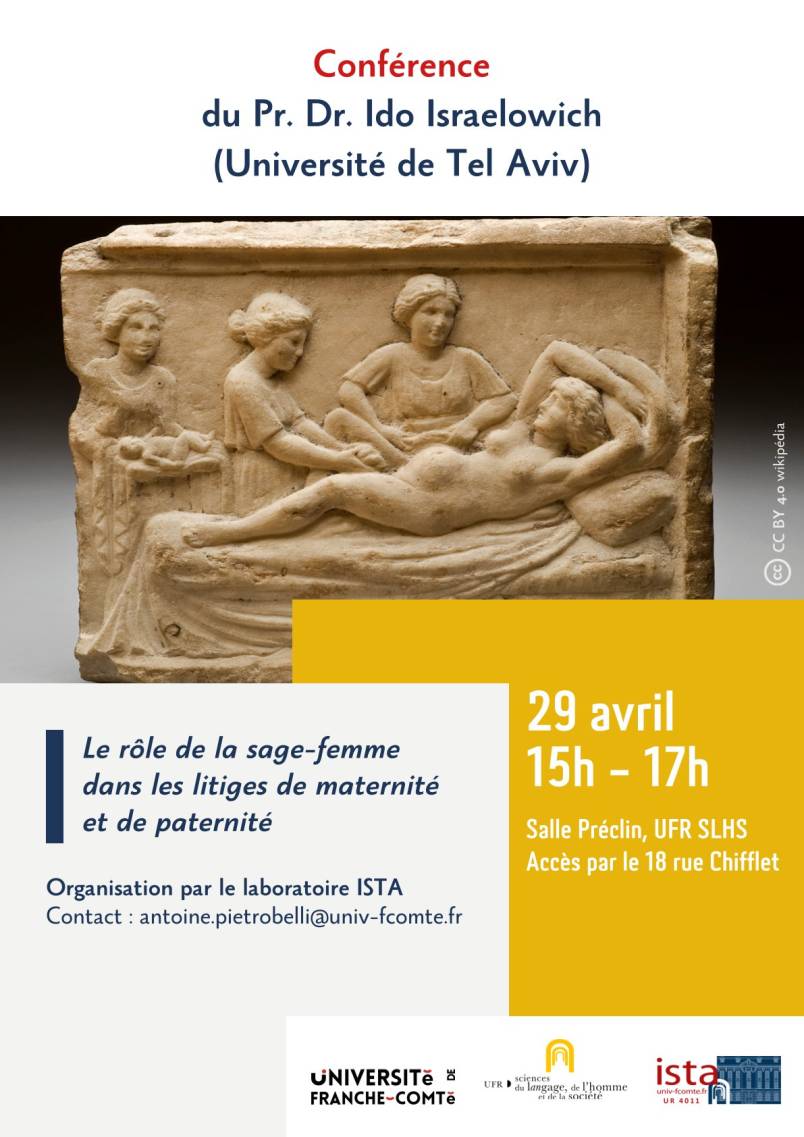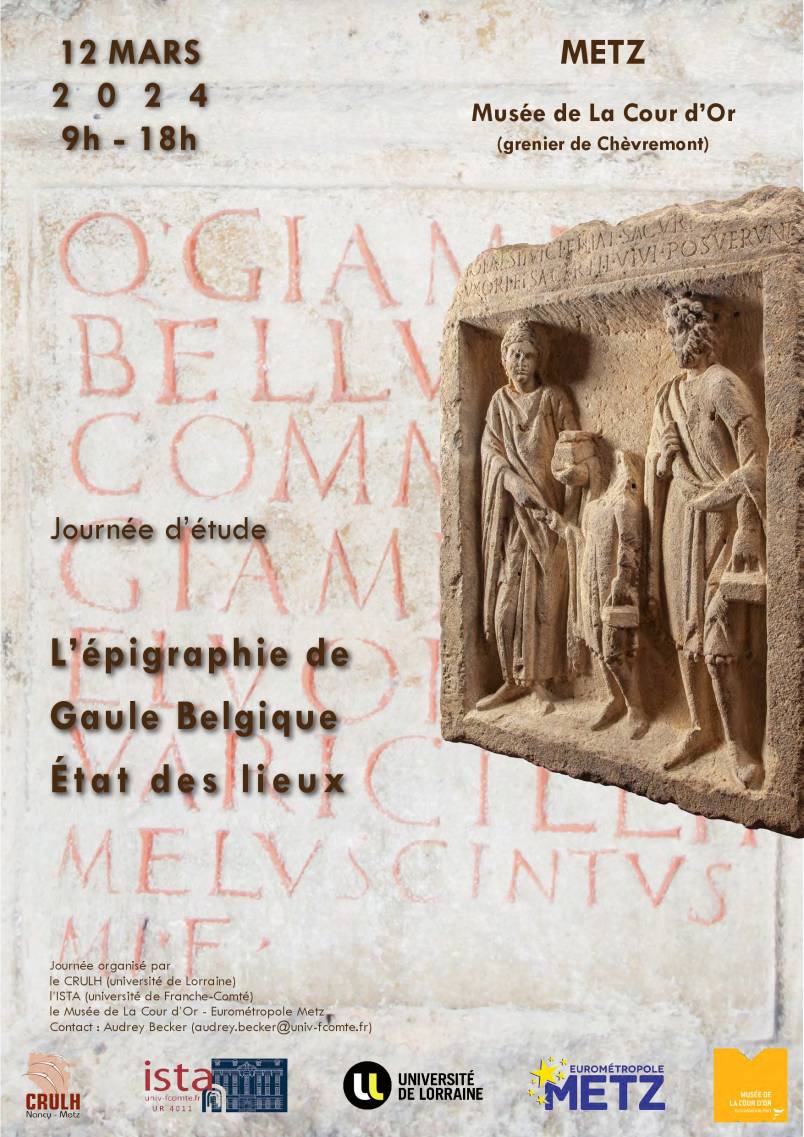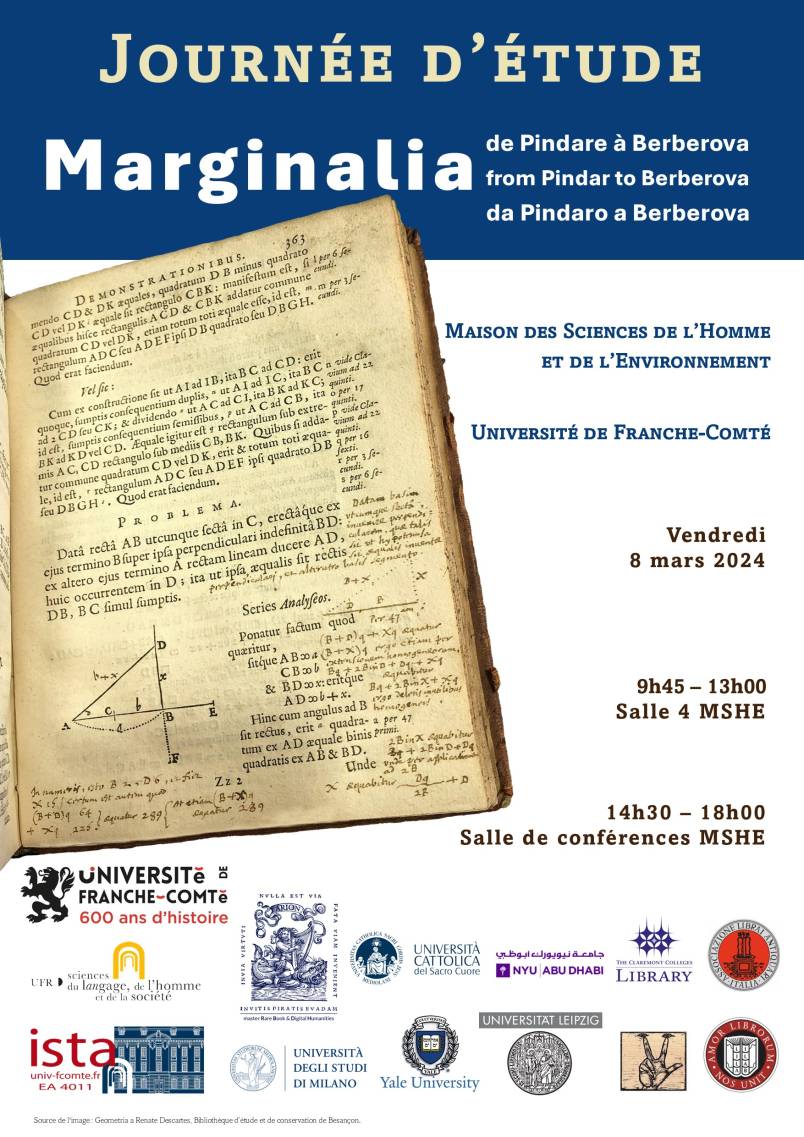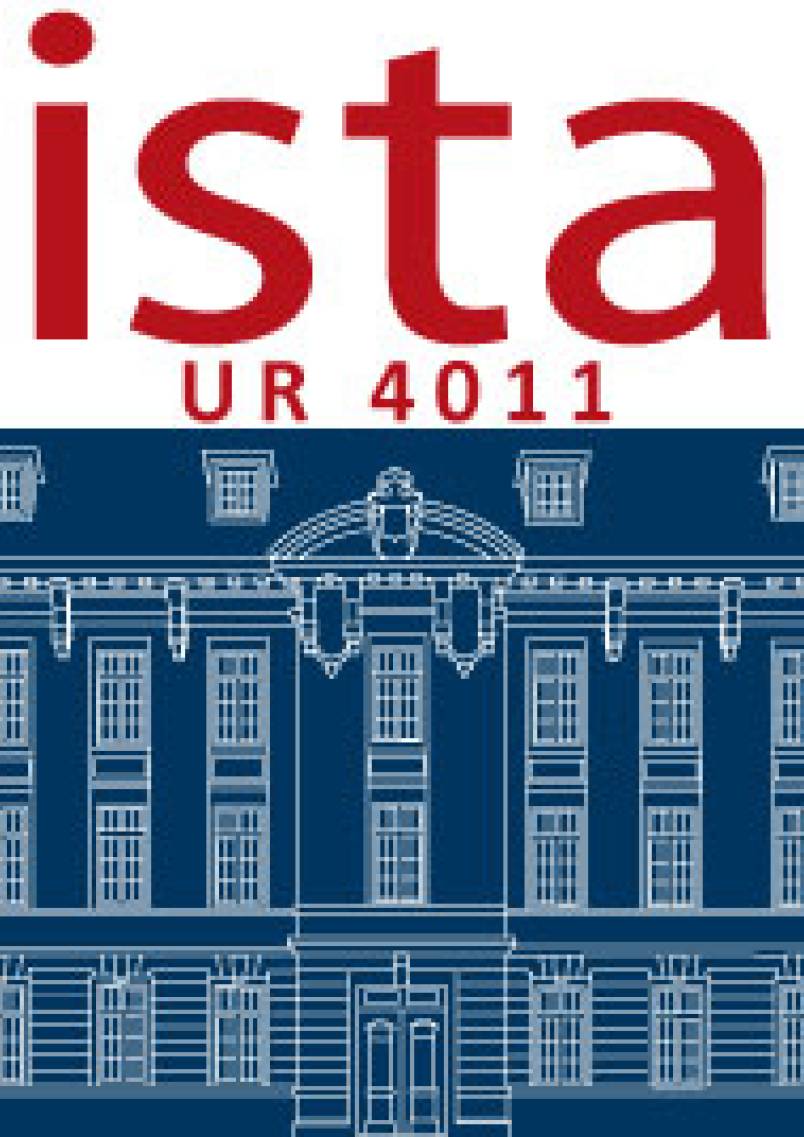Deprecated: pg_query(): Automatic fetching of PostgreSQL connection is deprecated in /var/www/ista/html/publista/Commun/dbHelper.php on line 204
Deprecated: pg_query(): Automatic fetching of PostgreSQL connection is deprecated in /var/www/ista/html/publista/Commun/dbHelper.php on line 268
Warning: Trying to access array offset on value of type bool in /var/www/ista/html/publista/Commun/dbHelper.php on line 282
Auteur :
Warning: Undefined property: stdClass::$prenom in /var/www/ista/html/publista/livre.php on line 83
Warning: Undefined property: stdClass::$nom in /var/www/ista/html/publista/livre.php on line 83
PUFC
Antonio GONZALES
Identifier les troubles mentaux en situation de violence structurelle dans les esclavages romain, américain, et contemporain
Antón ALVAR NUÑO
Abolir l’esclavage : de l’engagement individuel à l’action collective, critiques antiques et modernes
Olivier GRENOUILLEAU
Exploitation et liberté. Perspective de l’Antiquité depuis le temps présent
Domingo PLACIDO SUAREZ
L’esclavage et la dépendance dans l’œuvre de Francesco De Martino
Francesca REDUZZI MEROLA
Da sir Moses a Kyle Harper, e oltre: la “fine della schiavitu” antica. Considerazioni inattuali a margine di una ancora aperta discussione
Mario MAZZA
Gli “amici” del re: collaboratori o servi del loro sovrano?
Franca LANDUCCI GATTINONI
Schiavi pubblici ad Atene. Per una discussione sul rapporto fra amministrazione e politica
Leone PORCIANI
Esclavage et oikonomia dans l’Économique du Pseudo-Aristote
Ennio BIONDI
Qui est le maître, qui est l’esclave ? L’Humanisme en question dans La Tempête, de Shakespeare
Pierre JAMET
Des montagnes du Trentin aux fazendas de café du Brésil : une route de substitution à l’esclavage ?
Frédéric SPAGNOLI
Conclusion. Sur la fonction paradigmatique de l’esclavage : quelques remarques
Jacques ANNEQUIN
L’ouvrage regroupe des contributions qui réinterrogent la problématique de l’esclavage en la confrontant aux acquis de la recherche dans des domaines aussi variés que les questions de migration, d’exploitation, de travail. Il s’agit en fait de faire le point sur ce que l’on sait aujourd’hui de l’esclavage à un moment où celui-ci touche plus de 40 millions de personnes à travers le monde et dans des secteurs d’activités parfois insoupçonnables.
The book brings together contributions that ask again the problem of slavery by confronting it with research findings in fields as varied as migration, exploitation and labour issues. In fact, it is a question of taking stock of what is known today about slavery at a time when it affects more than 40 million people throughout the world and in sectors of activity that are sometimes unsuspected.
El libro reúne contribuciones que reinterpretan el problema de la esclavitud al confrontarlo con los resultados de investigaciones en campos tan variados como la migración, la explotación y las cuestiones laborales. De hecho, se trata de hacer balance de lo que se conoce hoy en día sobre la esclavitud en un momento en que afecta a más de 40 millones de personas en todo el mundo y en sectores de actividad que a veces son insospechados.
Deprecated: pg_query(): Automatic fetching of PostgreSQL connection is deprecated in /var/www/ista/html/publista/Commun/dbHelper.php on line 301
Deprecated: pg_query(): Automatic fetching of PostgreSQL connection is deprecated in /var/www/ista/html/publista/Commun/dbHelper.php on line 323
Auteur : Mario MAZZADa sir Moses a Kyle Harper, e oltre: la “fine della schiavitu” antica. Considerazioni inattuali a margine di una ancora aperta discussione[Résumé]Nel suo intervento congressuale (“The Idea of ’Transition’ and the End of Roman Slavery”, in A. Pinzone, E. Carli e R. Arcuri [a cura di], Forme di dipendenza nelle società di tran- sizione. Atti del XXXII Colloquio Intern. GIREA [Messina 14-17 Maggio 2008], Soveria Mannelli [CZ], 2012, p. 393‑412), Harper insiste particolarmente su due punti che risultano costituire i due cardini teorici della ricostruzione presentata nel volume. In primo luogo egli rileva la impre‑ cisione, la vaghezza, del concetto di “transizione”, e la irrilevanza teorica del ’modello’ ad esso connesso (il c.d. “Transition model”); in secondo luogo la inutilità, la inservibilità euristica, pace Marx, del concetto di “modo di produzione”. Mario Mazza è convinto, ma da una prospettiva molto diversa da quella di Harper, della irrilevanza teorica del “Transition model” –mentre ritiene assolutamente valido, anzi fondamentale, ai fini dell’analisi economica, il concetto di “modo di produzione”, inteso nel corretto senso marxiano, per riproporre, ridefinendo questi due concetti euristici, l’interpretazione della “fine della schiavitù antica”. Parole chiave : Schiavitù, Economia, “Modo di produzione”, “Modello di transizione”, “fine della schiavitu antica”. Résumé : Dans son intervention (« The Idea of “Transition” and the End of Roman Slavery », dans A. Pinzone, E. Carli et R. Arcuri [éds], Forme di dipendenza nelle società di transizione. Atti del XXXII Colloquio Intern. GIREA [Messina 14-17 Maggio 2008], Soveria Mannelli [CZ], 2012, p. 393‑412), Harper insiste particulièrement sur deux points qui représentent des axes théo‑ riques fondamentaux de la reconstruction présentée dans le volume. En premier lieu, il relève le caractère imprécis, vague du concept de “transition”, et l’insignifiance théorique du “modèle” qui lui est associé (le « Transition model ») ; en second lieu, l’inutilité euristique, n’en déplaise à Marx, du concept de « mode de production ». Mario Mazza est convaincu, mais d’un point de vue très différent de celui de Harper, de l’insignifiance théorique du « Transition model » – alors qu’il estime tout à fait valable, même fondamental, pour l’analyse économique, le concept de « mode de production », considéré dans son sens marxien correct, afin de reproposer, en redéfinissant ces deux concepts euristiques, l’interprétation de la « fin de l’esclavage antique ». Mots-clés : Esclavage, Économie, « Mode de production », « Modèle de Transition », « Fin de l’esclavage antique ». Abstract : In his paper (“The Idea of ’Transition’ and the End of Roman Slavery”, in A. Pinzone, E. Carli et R. Arcuri [eds], Forme di dipendenza nelle società di transizione. Atti del XXXII Colloquio Intern. GIREA [Messina 14-17 Maggio 2008], Soveria Mannelli [CZ], 2012, p. 393‑412), Harper emphasizes two points more particularly, which are fundamental theoretical bases of the reconstruction that the volume is presenting. For a start, he points out to the imprecise and vague character of the concept of “transition”, as well as the theoretical meaninglessness of the model which is associated to it (the “transition model”). Secondly he points out to the euristic uselessness of the concept of “production mode”, with all due respect to Marx. Mario Mazza is convinced that the “transition model” has no meaning theoretically, but from a point of view which is sgnificantly different from Harper’s – although he thinks that the “production mode”, in the strictly Marxist sense of the expression, is relevent and even essential for an economic analysis, in order to offer, by redefining both euristic concepts, another interpretation of the “end of ancient slavery”. Keywords :Slavery, Economics, “Production Model”, “Transition Model”, “End of Classical Slavery”.
Deprecated: pg_query(): Automatic fetching of PostgreSQL connection is deprecated in /var/www/ista/html/publista/Commun/dbHelper.php on line 323
Auteur : Francesca REDUZZI MEROLAL’esclavage et la dépendance dans l’œuvre de Francesco De Martino[Résumé]Après avoir discuté de la personnalité scientifique de l’historien du droit romain Francesco De Martino, j’aborde trois thème qui me semblent importants dans son œuvre: le problème de l’origine et de la diffusion de l’esclavage romain, la figure de Spartacus et le colonat. Mots-clés : F. De Martino, Esclavage romain, Diffusion, Spartacus, Colonat. Abstract :I describe the scientific personality of Francesco De Martino with regards to his thought on Roman slavery. I address the problem of the origins and of the extent of Roman slavery, the figure of Spartacus and the colonate. Keywords : F. De Martino, Roman Slavery, Origins, Spartacus, Colonate.
Deprecated: pg_query(): Automatic fetching of PostgreSQL connection is deprecated in /var/www/ista/html/publista/Commun/dbHelper.php on line 323
Auteur : Franca LANDUCCI GATTINONIGli “amici” del re: collaboratori o servi del loro sovrano?[Résumé]Il lavoro si concentra su una sorta di schiavitù ideale, quella dei cosiddetti amici del re nella corte ellenistica, un aspetto considerato da Greci e Macedoni di origine orientale. Attraverso la lettura delle fonti si delinea una dialettica “schiavitù orientale‑libertà ellenica” che è presente già in Erodoto e continua ad essere un leitmotiv in età ellenistica e di cui abbiamo testimonianza grazie agli Alessandrografi e Polibio. Parole chiave : Corte, Sudditanza, Propaganda, Libertà, Prosternazione. Résumé : Ce travail se concentre sur une sorte d’esclavage idéal, celui de ceux que l’on appelle les amis du roi dans la cour hellénistique, un aspect considéré par les Grecs et les Macédoniens d’origine orientale. À travers la lecture des sources, nous traçons les contours d’une dialectique « esclavage oriental‑liberté hellénique » qui est déjà présente chez Hérodote, qui continue de constituer un leitmotiv à l’époque hellénistique et dont témoignent les Alexandrographes et Polybe. Mots-clés : Cour, Sujétion, Propagande, Liberté, Prosternation. Abstract : The work focuses on a kind of ideal slavery, that of so‑called friends of the king in the Hellenistic court, an aspect considered by Greeks and Macedonians of oriental origin. Through the reading of sources it emerges a dialectic “Oriental slavery‑Hellenic freedom” that is already in Herodotus and continues to be a leitmotiv in the Hellenistic age according to the historians of Alexander the Great and Polybius. Keywords: Court, Subjection, Propaganda, Freedom, Prostration.
Deprecated: pg_query(): Automatic fetching of PostgreSQL connection is deprecated in /var/www/ista/html/publista/Commun/dbHelper.php on line 323
Auteur : Frédéric SPAGNOLIDes montagnes du Trentin aux fazendas de café du Brésil : une route de substitution à l’esclavage ?[Résumé]Les phénomènes de l’immigration italienne et de l’esclavage ont considérablement marqué la société brésilienne depuis le milieu du XIXème siècle mais ils ont souvent été totalement opposés, entre la supposée success story des Italiens et la tragédie de la traite transatlantique. L’étude des conditions de recrutement et de travail des Trentins dans les fazendas de café de l’État de São Paulo au cours de la deuxième moitié du XIXème siècle montre qu’en réalité cette migration a été pensée comme une route de substitution à l’esclavage par les grands propriétaires terriens paulistes, apportant ainsi un nouvel éclairage sur les liens entre migration italienne et esclavage. Mots-clés : Migration, Trentin, Italiens, Brésil, Esclavage, Café, São Paulo. Abstract : Since the middle of the 19th century, Italian migration and slavery have deeply influenced Brazilian society but these two phenomena have been often totally opposed between the so‑called Italian success story and the tragedy of transatlantic trade. The study of Trentini recruitment and working conditions in São Paulo State coffee fazendas in the second half of the 19th century shows that this migration has in fact been built as a substitution road to slavery by paulistas land owners. It therefore casts new light on the links between Italian migration and slavery. Keywords : Migration, Trentino, Italians, Brazil, Slavery, Coffee, São Paulo.
Deprecated: pg_query(): Automatic fetching of PostgreSQL connection is deprecated in /var/www/ista/html/publista/Commun/dbHelper.php on line 323
Auteur : Domingo PLÁCIDO SUAREZExploitation et liberté. Perspective de l’Antiquité depuis le temps présent[Résumé]Les possibilités de compréhension historique de l’esclavage antique passent par l’effort d’analyser les différences entre les sociétés de l’Antiquité et les sociétés actuelles. Les éléments fondamentaux pour l’analyse sont les facteurs dérivés de l’évolution du concept de liberté et les formes d’interaction de celle‑ci avec les différentes formes d’exploitation, entre la domination du travail servile et celle du travail salarié. L’analyse des réalités et de l’idéologie des sociétés modernes esclavagistes constitue une étape clef dans l’argumentation. Mots-clés : Exploitation, Esclavage, Antiquité, Sociétés modernes, Formes de liberté. Abstract : The possibilities of historical understanding of ancient slavery pass through the attempt to analyse the differences between the societies of Antiquity and current societies. Fundamental elements to the analysis are the factors derived from evolution of the concept of freedom and the ways of interaction of this one with the shapes of exploitation between the predominance of servile working and that of salaried working. The analysis of the realities and of the ideology of modern slavery societies is a key stage to the argumentation. Keywords : Exploitation, Slavery, Antiquity, Modern Societies, Ways of Freedom.
Deprecated: pg_query(): Automatic fetching of PostgreSQL connection is deprecated in /var/www/ista/html/publista/Commun/dbHelper.php on line 323
Auteur : Pierre JAMETQui est le maître, qui est l’esclave ? L’Humanisme en question dans La Tempête, de Shakespeare[Résumé]Avec l’étrangeté poétique de ce titre, La Tempête (car une tempête se dirait storm, plutôt que tempest, en anglais), Shakespeare offre au lecteur une proposition sur le temps comme principe d’ordre (eumétrie, clavier bien tempéré, tempus) et de désordre (anarchie, chaos clima‑ tique, tempestas). Cette polarité se retrouve entre autres dans la question de l’esclavage, puisqu’il est ici question d’une île où règne un maître occidental (Prospéro) sur un esclave qui ressemble assez à un indigène (Caliban). La pièce donne plusieurs possibilités de lecture : la première consiste à y voir un discours accompagnant plus ou moins consciemment la représentation colonialiste de l’époque – accompagnement teinté de bonne volonté chrétienne et de préceptes humanistes. La seconde, nettement plus troublante, consiste à y lire au contraire une réflexion sur les ambiguïtés profondes de l’humanisme lui‑même. Mots-clés : Shakespeare, Tempête, Esclavage, Humanisme, Ordre, Désordre, Prospéro, Caliban. Abstract : With such a strange and poetic title (since « storm » could legitimately have been preferred to « tempest »), Shakespeare is offering us a reflexion on time as principle of order (degree, the right interval, the well‑tempered clavier, tempus) and disorder (anarchy, bad weather, tempestas). This polarity is to be found notably in the question of slavery since the play is about an occidental master (Prospero) ruling over a slave who does look like a native (Caliban). In this respect, the play can be read in two contradicting ways: either as a discourse which accompanies the colonialist representation of the time –with Christian goodwill and humanist principles–, or as a troubling exposition of the ambiguities of Humanism itself. Keywords : Shakespeare, Tempest, Slavery, Humanism, Order, Disorder, Prospero, Caliban.
Deprecated: pg_query(): Automatic fetching of PostgreSQL connection is deprecated in /var/www/ista/html/publista/Commun/dbHelper.php on line 323
Auteur : Olivier GRENOUILLEAUAbolir l’esclavage : de l’engagement individuel à l’action collective, critiques antiques et modernes[Résumé]L’idée d’abolir l’esclavage fut d’abord celle de quelques individus à l’origine de réseaux abolitionnistes transatlantiques et européens qui essaimèrent à partir de la fin du XVIIIe siècle. Ils donnèrent progressivement naissance à de véritables mouvements populaires, notamment au Royaume‑Uni, mais aussi aux États‑Unis ou encore au Brésil des années 1870‑1880. Ce simple constat permet de soulever l’une des questions fondamentales de l’histoire de l’abolitionnisme, même si elle n’est pas toujours posée de manière explicite, à savoir celle des modalités encore obscures de ce passage entre engagement individuel et action collective. Mots-clés : Esclavage, Abolition, Engagement individuel, Engagement collectif, Mouvement populaire. Abstract : The idea of abolishing slavery came first from a few individuals who initiated aboli‑ tionist networks on both sides of the Atlantic Ocean which began to spread by the end of the 18th century. They gradually yielded popular social movements, particularly in the UK but also in the USA or in Brazil in the 1870s. This simple fact makes it possible to raise one of the most important questions of the history of abolitionism, even if it is not always very explicit, which is to understand the still obscure nature of the passage between individual commitment and collective action. Keywords : Slavery, Abolition, Personal Commitment, Collective Commitment, People’s Movement.
Deprecated: pg_query(): Automatic fetching of PostgreSQL connection is deprecated in /var/www/ista/html/publista/Commun/dbHelper.php on line 323
Auteur : Antón ALVAR NUÑOIdentifier les troubles mentaux en situation de violence structurelle dans les esclavages romain, américain et contemporain[Résumé]À travers l’étude comparative de l’idée de maladie mentale dans l’esclavage romain, américain avant la guerre de Sécession et contemporain ce travail prétend traiter deux questions. D’abord on étudiera comment l’interprétation des affections psychologiques chez les esclaves dépend de contextes culturels concrets et d’une finalité particulière. Ensuite, on analysera les possibilités d’appliquer de nouveaux concepts psychologiques aux sources historiques liées à l’esclavage, avec une attention particulière pour le trouble de stress post‑traumatique (en anglais PSD) et le questionnement dont fait l’objet son usage dans l’assistance psychologique contemporaine. Mots-clés : Esclavage, Santé mentale, Vitia animi, Souffrance psychologique, Drapétomanie, Dysaesthesia aethiopis, Trouble de stress post‑traumatique. Abstract: By applying a comparative analysis of the concept of mental distress in roman, ante- bellum American and modern slaveries I would like to tackle two questions. First, I will show how the interpretation of mental illness among slaves depends on concrete cultural contexts and has a particular finality. Then, I will analyse the possibilities of applying new psychological concepts to historical sources related to slavery, focusing especially in the posttraumatic stress disorder (PSD) and the critics towards its use in modern psychology. Keywords: Slavery, Mental Health, Vitia animi, Psychological Distress, Drapetomania, Dysaesthesia aethiopis, Posttraumatic Stress Disorder.
Deprecated: pg_query(): Automatic fetching of PostgreSQL connection is deprecated in /var/www/ista/html/publista/Commun/dbHelper.php on line 323
Auteur : Leone PORCIANISchiavi pubblici ad Atene. Per una discussione sul rapporto fra amministrazione e politica[Résumé]È vero che nella polis greca venivano affidate agli schiavi pubblici, o dēmosioi, delle funzioni “burocratiche” perché esse non facevano parte della politica come la concepivano gli antichi Greci? L’articolo discute questa tesi sottolineando il fatto che gli schiavi pubblici sono il prodotto di circostanze (contesti sociali ricchi di risorse) piuttosto che l’ipostasi del non‑cittadino, ed esplora la zona grigia che separa gli schiavi dagli uomini liberi dell’Atene democratica. In un contesto nel quale gli schiavi fanno spesso le stesse cose degli uomini liberi, ci si può chiedere se le azioni degli schiavi pubblici debbano essere viste come qualitativamente diverse da quelle dei cittadini. Parole chiave : Burocrazia, Democrazia ateniese, Dēmosioi, Polis, Politica, Schiavi. Résumé : Est‑il vrai que, dans la polis grecque, des fonctions « bureaucratiques » étaient confiées aux esclaves publics, ou dēmosioi, parce qu’elles ne font pas partie de la politique telle que la concevaient les Grecs anciens ? C’est l’idée examinée dans ce travail qui met en évidence le fait que les esclaves publics sont le produit de circonstances (contextes sociaux riches) plutôt que la personnification du non‑citoyen. Ce travail explore également la zone grise qui sépare les esclaves des hommes libres de l’Athène démocratique. Dans un contexte dans lequel les esclaves font souvent les mêmes choses que les hommes libres, on peut se demander si les actions des esclaves publics doivent être considérées comme différentes qualitativement de celles des citoyens. Mots-clés : Bureaucratie, Athènes démocratique, Dēmosioi, Polis, Politique, Esclaves. Abstract : Is it true that in the Greek polis public slaves, or dēmosioi, are entrusted with “bureau‑ cratic” functions because these functions are not part of politics as conceived of by the ancient Greeks? This article examines this idea, stresses the fact that public slaves are a product of circumstances (rich social contexts) rather than being the hypostasis of the non‑citizen, and explores the grey area between slaves and free people in democratic Athens. In a context in which slaves often do the same things as free men, it is questionable whether the actions of the public slaves should be viewed as qualitatively different from those of the citizens. Keywords: Bureaucracy, Democratic Athens, Dēmosioi, Polis, Politics, Slaves.
Deprecated: pg_query(): Automatic fetching of PostgreSQL connection is deprecated in /var/www/ista/html/publista/Commun/dbHelper.php on line 323
Auteur : Ennio BIONDIEsclavage et oikonomia dans l’Économique du Pseudo-Aristote[Résumé]L’article s’interroge sur le rôle de l’esclave dans l’oikos et l’oikonomia grecs. Si grâce à Xénophon et Aristote on pose les bases de la réflexion sur l’esclavage au sein de la gestion du patrimoine privé, le traité pseudo‑aristotélicien aborde la question de façon synthétique en dédiant un chapitre entier à ce problème. On aperçoit une évolution de la pensée esclavagiste grecque en raison de facteurs sociaux, économiques et culturels typiques de la fin de l’époque classique. Mots-clés : Propriété, Science, Morale, Maître, Instrument. Abstract : The article examines the role of the slave in Greeks oikos and oikonomia. If Xenophon and Aristotle lay the bases for reflection on slavery in the management of private property, the pseudo‑Aristotelian treatise addresses the issue synthetically by dedicating an entire chapter to this problem. We noticed an evolution of Greek thought slavery due to social factors, economic and cultural characteristics of the end of the classical period. Keywords: Property, Science, Ethics, Master, Instrument.





